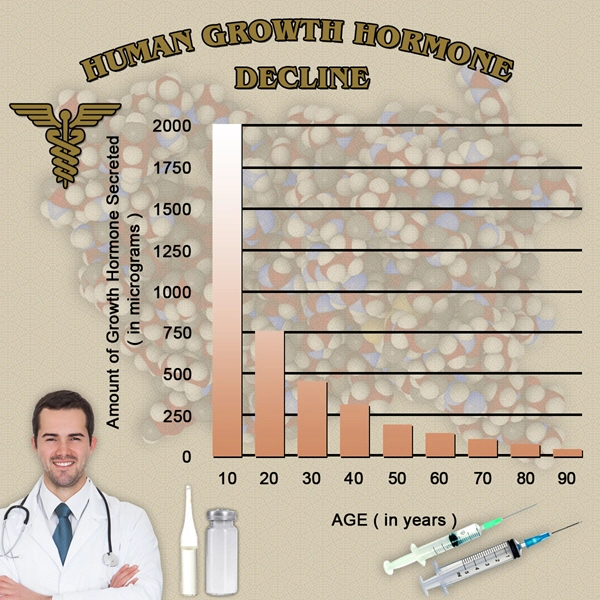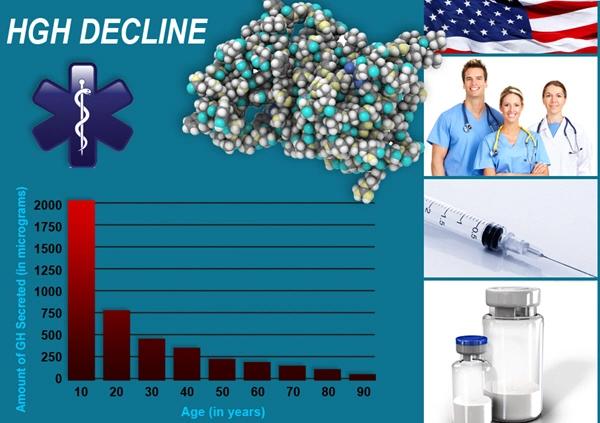Introduction
Cardiovascular diseases remain a leading cause of mortality among American males, prompting continuous research into preventive and therapeutic strategies. Among the emerging areas of interest is the role of peptide supplementation in modulating heart disease risk factors. Peptides, short chains of amino acids, have been studied for their potential to influence various physiological processes, including those related to cardiovascular health. This article delves into the current understanding of how peptide supplementation might impact heart disease risk factors in American males, offering insights into a potentially transformative approach to heart health.
Understanding Peptides and Their Mechanisms
Peptides are biologically active compounds that can exert a wide range of effects on the body. In the context of cardiovascular health, certain peptides have been identified for their ability to influence blood pressure, lipid metabolism, and inflammation—key factors in the development and progression of heart disease. For instance, natriuretic peptides are known to promote vasodilation and diuresis, which can help in managing hypertension, a significant risk factor for heart disease.
Peptide Supplementation and Blood Pressure
Hypertension is a prevalent condition among American males and a major contributor to cardiovascular morbidity and mortality. Research has explored the potential of peptides derived from various sources, such as milk and fish, to act as angiotensin-converting enzyme (ACE) inhibitors. By inhibiting ACE, these peptides can help lower blood pressure, thereby reducing the risk of heart disease. Studies have shown promising results, with certain peptide supplements demonstrating significant reductions in systolic and diastolic blood pressure in hypertensive individuals.
Impact on Lipid Profiles
Dyslipidemia, characterized by elevated levels of low-density lipoprotein (LDL) cholesterol and triglycerides, is another critical risk factor for heart disease. Some peptides have been found to influence lipid metabolism positively. For example, certain bioactive peptides can enhance the activity of enzymes involved in lipid breakdown and increase the expression of genes that promote the clearance of LDL cholesterol from the bloodstream. This modulation of lipid profiles can contribute to a reduced risk of atherosclerosis and subsequent cardiovascular events.
Anti-inflammatory Effects of Peptides
Chronic inflammation is a well-established contributor to the pathogenesis of cardiovascular diseases. Peptides with anti-inflammatory properties, such as those derived from dietary proteins, have been investigated for their potential to mitigate inflammation and thereby protect against heart disease. These peptides can inhibit the production of pro-inflammatory cytokines and reduce oxidative stress, both of which are implicated in the development of atherosclerosis and other cardiovascular conditions.
Clinical Evidence and Future Directions
While the theoretical benefits of peptide supplementation on heart health are compelling, clinical evidence remains limited and somewhat inconsistent. Some studies have reported significant improvements in cardiovascular risk factors with peptide supplementation, while others have found no significant effects. This variability underscores the need for further research, particularly large-scale, well-controlled clinical trials that can provide more definitive insights into the efficacy and safety of peptide supplements in American males.
Moreover, the personalization of peptide supplementation based on individual genetic and metabolic profiles could enhance its effectiveness in managing heart disease risk factors. Future research should also explore the optimal dosages, durations, and combinations of peptides to maximize their cardiovascular benefits while minimizing potential side effects.
Conclusion
Peptide supplementation represents a promising frontier in the prevention and management of heart disease among American males. By targeting key risk factors such as hypertension, dyslipidemia, and inflammation, peptides offer a multifaceted approach to cardiovascular health. However, the field is still in its early stages, and more robust clinical evidence is needed to establish the role of peptide supplements in routine cardiovascular care. As research progresses, peptide supplementation may emerge as a valuable tool in the fight against heart disease, offering new hope for improving the heart health of American males.

- Nicotinamide-N-methyltransferase (NNMT) Versus Its Inhibitor, a new way to promote weight loss? [Last Updated On: August 24th, 2025] [Originally Added On: May 27th, 2021]
- Ipamorelin: A Safe and Effective Alternative to HGH Injections [Last Updated On: May 29th, 2025] [Originally Added On: August 6th, 2021]
- Peptides: Unleashing Potential in Modern Medicine [Last Updated On: March 2nd, 2025] [Originally Added On: March 2nd, 2025]
- Exploring the Role of Peptides in Diabetes Management: Advances and Therapeutic Potential [Last Updated On: March 3rd, 2025] [Originally Added On: March 3rd, 2025]
- Exploring Peptide Therapy in Neurological Disorder Treatment [Last Updated On: March 4th, 2025] [Originally Added On: March 4th, 2025]
- Exploring Peptide-Based Immunotherapy: Advances and Challenges in Cancer Treatment [Last Updated On: March 5th, 2025] [Originally Added On: March 5th, 2025]
- Unlocking the Fountain of Youth: Exploring the Anti-Ageing Potential of Peptides [Last Updated On: March 6th, 2025] [Originally Added On: March 5th, 2025]
- Revolutionizing Men's Health: Peptide Therapeutics in Chronic Disease Management [Last Updated On: March 6th, 2025] [Originally Added On: March 6th, 2025]
- Antimicrobial Peptides: A Promising Solution for Men's Health Against Bacterial Infections [Last Updated On: March 7th, 2025] [Originally Added On: March 7th, 2025]
- Exploring the Frontier: The Evolving Role of Peptides in Allergy Treatment for American Males [Last Updated On: March 7th, 2025] [Originally Added On: March 7th, 2025]
- Peptides in Dermatology: Transforming Men's Skincare for Youthful Skin Health [Last Updated On: March 8th, 2025] [Originally Added On: March 8th, 2025]
- Revolutionizing Male Health: Harnessing Biomimetic Peptides for Regenerative Medicine Advancements [Last Updated On: March 9th, 2025] [Originally Added On: March 9th, 2025]
- Unlocking the Potential of Therapeutic Proteins and Peptides: Advances and Obstacles in Modern Medicine [Last Updated On: March 12th, 2025] [Originally Added On: March 12th, 2025]
- Peptides and Epigenetics: Impact on American Male Health and Disease [Last Updated On: March 13th, 2025] [Originally Added On: March 13th, 2025]
- Peptides Pioneering Personalized Medicine: A New Frontier for American Men [Last Updated On: March 13th, 2025] [Originally Added On: March 13th, 2025]
- Unveiling the Power of Peptides in Wound Healing and Tissue Repair for American Males [Last Updated On: March 15th, 2025] [Originally Added On: March 15th, 2025]
- Peptides and Gene Therapy: Revolutionizing Health for American Males [Last Updated On: March 17th, 2025] [Originally Added On: March 17th, 2025]
- Peptide Vaccines: A Promising Frontier for American Males' Health [Last Updated On: March 18th, 2025] [Originally Added On: March 18th, 2025]
- Peptide Therapies: A Promising Approach to Combat Obesity in American Males [Last Updated On: March 18th, 2025] [Originally Added On: March 18th, 2025]
- Peptides: A New Frontier in Managing Respiratory Health for American Males [Last Updated On: March 19th, 2025] [Originally Added On: March 19th, 2025]
- Peptide-Enhanced Stem Cell Therapies: Revolutionizing Health for American Males [Last Updated On: March 19th, 2025] [Originally Added On: March 19th, 2025]
- Peptides: A Promising Solution for Metabolic Disorders in American Males [Last Updated On: March 19th, 2025] [Originally Added On: March 19th, 2025]
- Peptides in Veterinary Medicine: Enhancing Animal Health and Performance [Last Updated On: March 20th, 2025] [Originally Added On: March 20th, 2025]
- Peptide Therapeutics: Revolutionizing Chronic Disease Management for American Males [Last Updated On: March 20th, 2025] [Originally Added On: March 20th, 2025]
- Peptides: Enhancing Health and Performance in American Males [Last Updated On: March 21st, 2025] [Originally Added On: March 21st, 2025]
- Peptides: Revolutionizing Men's Health in Muscle Growth, Anti-Aging, and More [Last Updated On: March 21st, 2025] [Originally Added On: March 21st, 2025]
- Peptides: A New Frontier in Fighting Infectious Diseases for American Males [Last Updated On: March 21st, 2025] [Originally Added On: March 21st, 2025]
- Peptides: Revolutionizing Diagnostics and Drug Delivery for American Males' Health [Last Updated On: March 22nd, 2025] [Originally Added On: March 22nd, 2025]
- Peptides Revolutionizing Eye Health Treatment for American Males [Last Updated On: March 22nd, 2025] [Originally Added On: March 22nd, 2025]
- Peptide Therapies: A New Frontier for Treating Rheumatic Diseases in American Males [Last Updated On: March 22nd, 2025] [Originally Added On: March 22nd, 2025]
- Peptides: A Promising Solution for Hair Loss in American Males [Last Updated On: March 23rd, 2025] [Originally Added On: March 23rd, 2025]
- Peptides in Endocrinology: Managing Diabetes, Growth Hormone, and Testosterone in American Males [Last Updated On: March 24th, 2025] [Originally Added On: March 24th, 2025]
- Bioactive Peptides: Enhancing Men's Health from Muscle to Cancer Prevention [Last Updated On: March 24th, 2025] [Originally Added On: March 24th, 2025]
- Peptides and Male Fertility: Exploring Therapeutic Potential and Future Directions [Last Updated On: March 24th, 2025] [Originally Added On: March 24th, 2025]
- Peptides' Role in Enhancing Liver Health for American Males: A Scientific Overview [Last Updated On: March 24th, 2025] [Originally Added On: March 24th, 2025]
- Peptide-Based HIV Vaccines: Progress and Promise for American Males [Last Updated On: March 24th, 2025] [Originally Added On: March 24th, 2025]
- Peptides: A New Frontier in Mental Health for American Males [Last Updated On: March 25th, 2025] [Originally Added On: March 25th, 2025]
- Peptide Therapies Revolutionizing Transplant Medicine for American Males [Last Updated On: March 25th, 2025] [Originally Added On: March 25th, 2025]
- Peptides Revolutionize Toxicology: Diagnostics, Therapeutics, and Vaccines for American Males [Last Updated On: March 25th, 2025] [Originally Added On: March 25th, 2025]
- Peptide Radiopharmaceuticals: Advancing Men's Health in Cancer and Cardiovascular Care [Last Updated On: March 25th, 2025] [Originally Added On: March 25th, 2025]
- Peptides: A Revolutionary Approach to Cardiovascular Health for American Men [Last Updated On: March 25th, 2025] [Originally Added On: March 25th, 2025]
- Peptides: Enhancing Gut Health and Well-being in American Males [Last Updated On: March 25th, 2025] [Originally Added On: March 25th, 2025]
- Peptide-Based Biomarkers: Revolutionizing Disease Detection in American Males [Last Updated On: March 25th, 2025] [Originally Added On: March 25th, 2025]
- Peptides Revolutionizing Dentistry: Benefits for American Men's Oral Health [Last Updated On: March 25th, 2025] [Originally Added On: March 25th, 2025]
- Peptides Offer Hope for American Males with Neuropathic Pain: Recent Research Insights [Last Updated On: March 25th, 2025] [Originally Added On: March 25th, 2025]
- Peptides Revolutionizing Sports Medicine: Enhancing Performance and Recovery in Athletes [Last Updated On: March 25th, 2025] [Originally Added On: March 25th, 2025]
- Peptide-Enriched Skincare: Benefits and Advances for American Males [Last Updated On: March 25th, 2025] [Originally Added On: March 25th, 2025]
- Peptide Therapeutics: Targeted Hope for American Males with Rare Diseases [Last Updated On: March 26th, 2025] [Originally Added On: March 26th, 2025]
- Peptide Drugs in Pediatrics: Targeted Treatments for American Males' Children [Last Updated On: March 26th, 2025] [Originally Added On: March 26th, 2025]
- Stem Cells and Peptides: Revolutionizing Regenerative Medicine for American Males [Last Updated On: March 26th, 2025] [Originally Added On: March 26th, 2025]
- Peptides Revolutionizing Trauma Care: From Hemostasis to Neuroprotection [Last Updated On: March 26th, 2025] [Originally Added On: March 26th, 2025]
- Peptide Nanotechnology: Revolutionizing Cancer, Heart Disease, and Diabetes Treatment for American Males [Last Updated On: March 26th, 2025] [Originally Added On: March 26th, 2025]
- Peptides Enhance Photodynamic Therapy: A Promising Treatment for American Men's Health [Last Updated On: March 26th, 2025] [Originally Added On: March 26th, 2025]
- Peptide Vaccines: Revolutionizing Disease Prevention in Veterinary Medicine [Last Updated On: March 26th, 2025] [Originally Added On: March 26th, 2025]
- Peptides in Stroke Recovery: Potential and Challenges for American Males [Last Updated On: March 27th, 2025] [Originally Added On: March 27th, 2025]
- Peptide Bioinformatics: Revolutionizing Precision Medicine for American Males [Last Updated On: March 27th, 2025] [Originally Added On: March 27th, 2025]
- Peptide Therapies: Revolutionizing Gastrointestinal Health for American Males [Last Updated On: March 27th, 2025] [Originally Added On: March 27th, 2025]
- Peptides in Epilepsy: New Hope for American Males' Treatment and Management [Last Updated On: March 28th, 2025] [Originally Added On: March 28th, 2025]
- Peptide-Based Biosensors: Revolutionizing Early Disease Detection in American Males [Last Updated On: March 28th, 2025] [Originally Added On: March 28th, 2025]
- Peptides: A Promising Solution to Antibiotic Resistance in American Males [Last Updated On: March 28th, 2025] [Originally Added On: March 28th, 2025]
- Peptide Therapy: A New Hope for American Men with Neurodegenerative Diseases [Last Updated On: March 28th, 2025] [Originally Added On: March 28th, 2025]
- Peptide Therapies: Enhancing Bone Health in American Males [Last Updated On: March 28th, 2025] [Originally Added On: March 28th, 2025]
- Peptides: A Targeted Approach to Managing Inflammation in American Males [Last Updated On: March 28th, 2025] [Originally Added On: March 28th, 2025]
- Peptide Therapy: A New Hope for American Males with Hematological Disorders [Last Updated On: March 29th, 2025] [Originally Added On: March 29th, 2025]
- Peptide-Based Anti-venoms: Revolutionizing Snakebite Treatment for American Males [Last Updated On: March 29th, 2025] [Originally Added On: March 29th, 2025]
- Peptide-Polymer Composites: Revolutionizing Targeted Therapy for American Males [Last Updated On: March 29th, 2025] [Originally Added On: March 29th, 2025]
- Peptides as Cell-Penetrating Agents: Revolutionizing Men's Health Treatments [Last Updated On: March 30th, 2025] [Originally Added On: March 30th, 2025]
- Peptides in Burn Wound Management: Healing and Scar Reduction for American Males [Last Updated On: April 1st, 2025] [Originally Added On: April 1st, 2025]
- Peptide Drug Conjugates: Revolutionizing Targeted Therapy for American Men's Health [Last Updated On: April 1st, 2025] [Originally Added On: April 1st, 2025]
- Peptides in Managing Acute Kidney Injury: Benefits and Challenges for American Males [Last Updated On: April 2nd, 2025] [Originally Added On: April 2nd, 2025]
- Peptides in Substance Abuse Treatment: Mechanisms, Applications, and Future Prospects [Last Updated On: April 2nd, 2025] [Originally Added On: April 2nd, 2025]
- Peptides: A Promising Treatment for Ocular Infections in American Males [Last Updated On: April 5th, 2025] [Originally Added On: April 5th, 2025]
- Peptide Therapies: A New Frontier in Treating Osteoporosis in American Males [Last Updated On: April 6th, 2025] [Originally Added On: April 6th, 2025]
- Peptide Therapies: A New Frontier in Prostate Cancer Treatment [Last Updated On: April 8th, 2025] [Originally Added On: April 8th, 2025]
- Peptide Therapy: A New Hope for Autoimmune Diseases in American Males [Last Updated On: April 8th, 2025] [Originally Added On: April 8th, 2025]
- Peptides in Geriatric Medicine: Enhancing Muscle, Cognitive, and Metabolic Health in Aging Males [Last Updated On: April 8th, 2025] [Originally Added On: April 8th, 2025]
- Peptide Therapy: Enhancing Post-Operative Recovery for American Males [Last Updated On: April 9th, 2025] [Originally Added On: April 9th, 2025]
- Peptide Therapy: A Promising New Approach to Treating Depression in American Men [Last Updated On: April 9th, 2025] [Originally Added On: April 9th, 2025]
- Peptide Therapies: Revolutionizing Genetic Disorder Treatment for American Males [Last Updated On: April 11th, 2025] [Originally Added On: April 11th, 2025]
- Peptides in Veterinary Dermatology: Promises, Challenges, and the American Male Perspective [Last Updated On: April 11th, 2025] [Originally Added On: April 11th, 2025]



List of USA state clinics - click a flag below for blood testing clinics.
Word Count: 614


















































